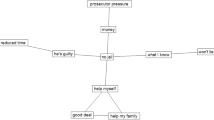Abstract
This research contributes to a further understanding of prosecutorial discretion by exploring tenets of casual attribution theory and etiology of bias theory as each informs an uncertainty avoidance perspective on the prosecutor's decision to divert felony drug defendants from criminal prosecution and into a treatment program. The sociolegal consequences of the exercise of this early screening decision are expressed by both conflict theorists and labeling theorists. Our analysis involves estimating main effects and interaction effects of defendant ascribed status and achieved status on the likelihood of diversion. The findings indicate partial support for hypotheses derived, from the theoretical perspectives pursued. In addition these findings point to a more complex model of the subjective nature of the exercise of prosecutorial discretion, a model that benefits from understanding the salience of minimizing uncertainty in the decision to criminals.
Similar content being viewed by others
References
Albonetti, C. A. (1986). Criminality, prosecutorial screening, and uncertainty: Toward a theory of discretionary decision making in felony case processing.Criminology 23: 623–644.
Albonetti, C. A. (1987). Prosecutorial discretion: The effects of uncertainty.Law Society Rev. 21: 291–318.
Aldrich, J. H., and Nelson, F. D. (1984).Linear Probability, Logit, and, Probit, Sage, Beverly Hills, CA.
Becker, H. (1963).Outsiders: Studies in the Sociology of Deviance. Free Press of Glencoe, New York.
Blumberg, A. (1967). The practice of law as a confidence game: Organizational cooptation of a profession.Law Society Rev. 15: 1–12.
Cannavale, F. J., and Falcon, W. D. (1976).Witness Cooperation. Heath, Lexington, MA.
Carroll, J. S. (1978). Causal theories of crime and their effect upon expert parole decisions.Law Hum. Behav. 2: 377–388.
Cicourel, A. (1968).The Social Organization of Juvenile Justice, John Wiley & Sons, New York.
Clegg, S., and Dunkerley, D. (1980).Organization, Class and Control, Routledge and Kegan Paul, Boston.
Cox, S. (1976). Prosecutorial discretion: An overview.Am. Crim. Law Rev. 3: 383–343.
Cyert, R. M., and March, J. G. (1963)A Behavioral Theory of the Firm, Prentice-Hall, Englewood Cliffs, NJ.
Eisenstein, J. and Jacob, H. (1977)Felony Justice: An Organizational Analysis of Criminal Courts, Little, Brown, Boston.
Emerson, R. M. (1969).Judging Delinquents: Context and Process in Juvenile Court, Aldines, Chicago.
Frohmann, L. (1991). Discrediting victims' allegations of sexual assault: Prosecutorial accounts of case rejections.Social Problems 38: 213–226.
Grosman, B. (1969).The Prosecutor: An Inquiry into the Exercise of Discretion, University of Toronto Press, Toronto.
Hall, D. E. (1975). Role of the victim in the prosecution and disposition of criminal cases.Vanderbilt Law Rev. 28: 931–985.
Harris, A. R. (1977). Sex and theories of deviance: Toward a functional theory of deviant typescripts.Am. Sociol Rev. 43: 3–16.
Harris, A. R., and Hill, G. D. (1984). Bias in status processing decisions. In Harris, A. R. (ed.),Rationality and Collective Belief: Advances in Social Psychology, Ablex, Norwood, NJ.
Hawkins, R., and Tiedeman, G. (1975).The Creation of Deviance, Charles E. Merrill, Columbus, OH.
Hill, G. D., Harris, A. R. and Miller, J. L. (1985). The etiology of bias: Social heuristics and rational decision making in deviance processing.J. Res. Crime Delinq. 22: 135–162.
Hosemer, D. W. Jr., and Lemeshow, S. (1989).Applied Logistic Regression John Wiley and Sons, New York.
Jacoby, J. (1980).The American Prosecutor: A Search for Identity, Lexington, Lexington, MA.
Kerstetter, W. A. (1990). Gateway to justice: Police and prosecutorial responses to sexual assaults against women.J. Crim. Law Criminol. 81: 267–313.
Kress, J. M. (1976). Progress and prosecution.Ann. Am. Acad. Polit. Social Sci. 423: 99–116.
Littrell, W. B. (1976).Bureaucratic Justice: Police, Prosecutors, and Plea Bargaining, Sage, Beverly Hills, CA.
March J. G., and Simon, H. A. (1963).Organizations, Wiley, New York.
Mather, L. (1979).Plea Bargaining or Trial? Lexington, Lexington, MA.
McDonald, W. F. (1979). From plea negotiation to coercive justice: Notes on the respecification of a concept.Law Society Rev. 13: 385–392.
Miller, F. (1970).Prosecution: The Decision to Charge a Suspect with a Crime, Little, Brown, Boston.
Myers, M., and Hagan, J. (1979). Private and public trouble: Prosecution and the allocation of court resources.Social Problems 26: 439–452.
Neubauer, D. (1974). After the arrest: The charging decision in Prairie City.Law Society Rev. 8: 495–517.
Newman, D. J. (1966).Conviction: The Determination of Guilt or Innocence Without Trial, Little, Brown, Boston.
Rauma, D. (1984). Going for the gold: Prosecutorial decision making in cases of wife assault.Social Sci. Res. 13: 321–351.
Rubington, E., and Weinberg, M. S. (1987).Deviance: The Interactionist Perspective, Macmillan, New York.
Schmidt, J., and Steury, E. H. (1989). Prosecutorial discretion in filing charges in domestic violence cases.Criminology 27: 487–510.
Shaver, K. G. (1975).An Introduction to Attribution Processes, Winthrop, Cambridge, MA.
Spohn, C., Gruhl, J., and Welch, S. (1987). The impact of the ethnicity and gender of defendants on the decision to reject or dismiss felony charges.Criminology 25: 175–192.
Stanko, E. (1981–1982). The impact of victim assessment on prosecutor's screening decisions: The case of the New York County district attorney's office.Law Society Rev. 16: 225–239.
Sudnow, D. (1965). Normal crimes: Sociological features of the penal code in a public defender office.Social Problems 12: 255–276.
Swigert, V., and Farrell, R. A. (1976).Murder, Inequality, and the Law. Heath, Lexington, MA.
Thompson, J. D. (1976).Organizations in Action, McGraw-Hill, New York.
Turk, A. (1969).Criminality and Legal Order, Rand McNally, Chicago.
Williams, K. M. (1976). The effects of victim characteristics on the disposition of violent crimes. In McDonald, W. F. (ed.),Criminal Justice and the Victim, Sage, Beverly Hills, CA.
Author information
Authors and Affiliations
Rights and permissions
About this article
Cite this article
Albonetti, C.A., Hepburn, J.R. Prosecutorial discretion to defer criminalization: The effects of defendant's ascribed and achieved status characteristics. J Quant Criminol 12, 63–81 (1996). https://doi.org/10.1007/BF02354471
Issue Date:
DOI: https://doi.org/10.1007/BF02354471




